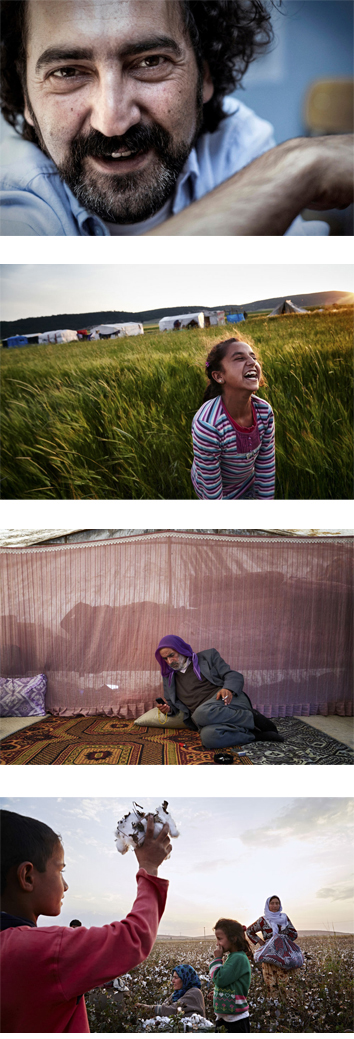 Özgeçmiş:
Özgeçmiş:
Servet Dilber was born in 1975 in Istanbul. He graduated from Kabatas High School. After graduating from Mimar Sinan University Faculty of Fine Arts Department of Photography, he worked as a photo editor in newspaper, magazine and book projects. His photographs have also been published in national and international magazines and newspapers such as Photo Atlas , National Geographic Turkey, Die Zeit, Le Monde, the Financial Times, and The Guardian.
Dilber has spent a long time taking photographs of cultural and environmental subjects and he lives in Istanbul.
Exhibition: Endless Harvest
They return to their homes after travelling from city to city, and from land to land. Everything indeed is for their roof that make them feel safe. The desire to live, marry and equipping themselves under that roof is the reason for their seasonal work.
Seasonal agricultural workers, whose lives are tied to soil, and who live half of a year without a roof over their heads but do it to protect that roof have similar destinies.
Women… Men… Children… They are hundreds of kilometers away from their homes for months… Neither the soil belongs to them nor the produce that they harvest. The only constant in their lives is their hunt for new crop…
The cities, where their routes start changes but there are four centers in Turkey: Adıyaman, Şanlıurfa, Diyarbakır, and Kahramanmaraş. They start their journeys in summer months. They go to the stranger’s lands that call them, they go to the lands that are ready to be harvested. Together with their children…
They live in tents and unsound structures. They work all day long and gather around a dinner table in the evening. Their hands that have to work all day long touches cotton, cherries, hoes or hazelnuts. The things they touch change by seasons. But the things they go through are probably always the same: To inhabit the region that they went for work, to work for survival, and to try to find a way to educate their children in strange lands.
Children start this journey when they are babies. They are born in tents near plantations, they start to crawl and walk there, and in the end they work at the same plantations.
First they do sub tasks. Even that they do not actually work in the plantation, they do carry water, keep an eye on the belongings in tents, prepare meals and wash dishes and do the cleaning. But they do suffer from illnesses and accidents because of migrating from city to city.
They are asked to grow up fast. In fact some start to “get paid” at the age of 9 and some at 10. Although they are not allowed to work legally before the age of 15 this poses no problem. Because they are not seen. Or rather they don’t want to be seen.
However what they are going through is not a few “exceptions”. Their names are not written in reports even “mistakenly”. They are a huge social problem which increases exponentially from generations to generations. According to the 2012 Turkish Statistics Institution data, the number of children in plantations is 44.7% of the total working children, in other words half of their number. This means that about 350 to 400 thousand children is a part of this life. And it is almost impossible to get out.
Their pasts are filled with sorrow stories. They all have children that died because they were born in plantations and could not receive proper care; they all have sisters that died, and mothers that drowned in rivers. They are moved to tears and sometimes secretly cry. But there is no place for emotions here. They have to stay strong to continue their lives.
Therefore they always say “thank god”. They continue those words by explaining that they have nothing else to do. When they say goodbye they say: “This is life, this is our destiny.”
This post is also available in: Turkish


 English
English Türkçe
Türkçe